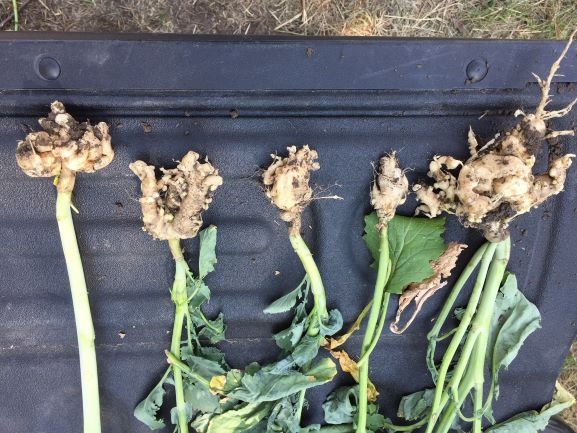
Disease issues are always a concern for farmers.
Scattered showers, and hot, humid conditions can be the ideal breeding ground for disease.
Some canola producers have been busy spraying for scloerotinia.
SaskCanola Agronomy Specialist Kaeley Kindrachuk says crop development is quite varied around the province.
"Some fields because of the conditions earlier this spring maybe a little bit delayed, and then there's some areas of the province where we've got full bloom happening. Spraying for sclerotinia and then even the odd field where the crop is coming out of bloom already. So it's kind of just variable depending on where in the province you are."
Another key disease concern for canola producers is clubroot.
Kindrachuk says clubroot is an invasive soil borne disease, that causes galls to form on the roots.
Those galls reduce the plant's ability to take up water and nutrients resulting in yield loss.
The first case of visible clubroot symptoms was found in a canola field near Edmonton in 2003 and has since spread to a number of counties in Alberta.
In Saskatchewan, the first two confirmed symptomatic cases of clubroot were found in 2011.
In 2021, 80 commercial canola fields in the province showed visible signs of clubroot.
SaskCanola is once again offering producers free disease testing for clubroot.
Kindrachuk says for early detection, the ideal time to test for the disease is in the fall.
"When we can do a soil test, and detect the spores in the soil. Then it's a lot easier to start managing the disease, before we start seeing the clubroot galls forming on the canola plant."
Farmers can request a soil sampling bag from SaskCanola, the Ministry of Agriculture or a plant health officer with SARM.
Soil collected from the field is submitted to the lab for testing with SaskCanola covering the cost.
SaskCanola this year is also offering a free blackleg test to the first 200 registered canola growers who apply.
Blackleg infects canola seedlings eventually causing a dry rot at the base of the stem, that cuts off water and nutrient flows, which results in premature ripening and reduced yield.
She notes they've been seeing an increase in blackleg in the province.
"We're also seeing a breakdown in the resistance in canola. So, the best way to make those decisions with what canola seed to plant in the field the next time canola is grown, is to know what races are present."
Kindrachuk says farmers can collect plant stems suspected of infection and then contact SaskCanola to receive a blackleg testing code.
Results are returned to producers by email.
She adds that private sector agrologists can also send in samples on behalf of farmers.
Click here to see more...